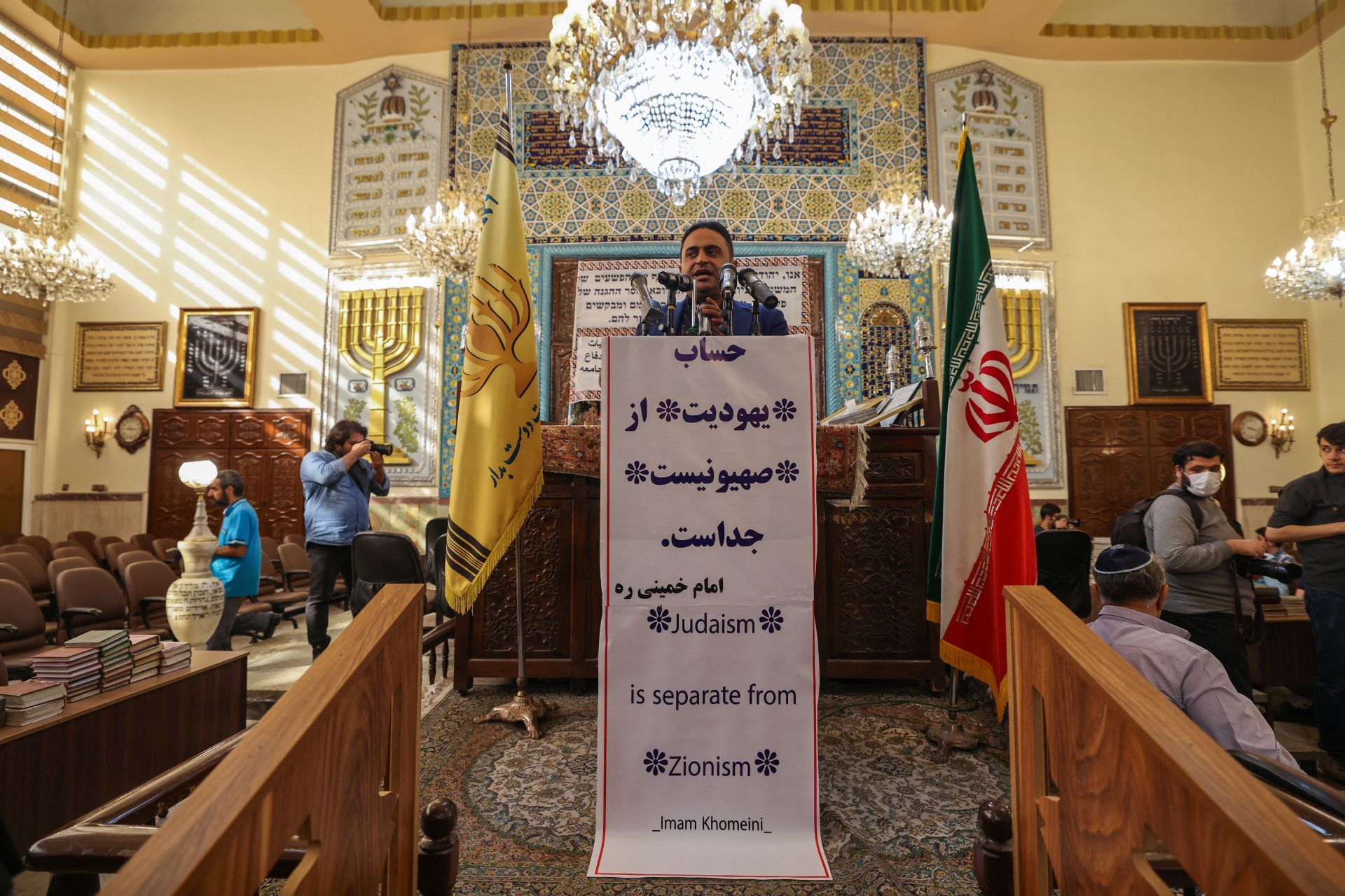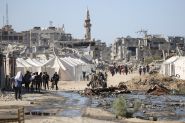- Home
- Middle East
- Between a Rock and a Hard Place: The Delicate Position of Iran’s Jews

©ATTA KENARE/AFP
Quiet yet deeply rooted, the Jewish presence in Iran, with around 10,000 members, navigates a delicate balance: officially recognized by the Islamic Republic, it must nonetheless publicly adhere to a strict anti-Zionist stance in a country openly hostile to Israel.
With around 10,000 members, Iran’s Jewish community is the second largest in the Middle East. Its presence is discreet but tangible in a nation marked by pronounced hostility toward Israel, most recently expressed during 12 days of open conflict last June.
The Jewish presence in the lands of present-day Iran dates back to the eighth century BCE, according to the Second Book of Kings in the Old Testament, following the defeat of the Kingdom of Israel by the Assyrians, who reportedly deported a small part of the population to cities in Media. Assyrian tablets indicate that a second deportation of Jews to Media took place during the reign of King Ashurbanipal, around the time of the Babylonian exile.
“Historically, there has been no hostility between the Jewish people and the Persians,” David Rigoulet-Roze, the editor-in-chief of the journal Orients Stratégiques and a Middle East specialist, told This is Beirut. “It is worth noting that Cyrus the Great, the founder of the Achaemenid Persian Empire, allowed Jews who had been exiled to Mesopotamia under the Babylonian king Nebuchadnezzar II around 586 BCE to return to Palestine half a century later.”
A Rift with the Islamic Revolution
During the reign of Mohammad Reza Shah Pahlavi, Iran was home to roughly 100,000 Jews, who enjoyed civil rights and were mainly concentrated in Tehran, Shiraz and Isfahan. However, the community declined sharply after the Islamic Revolution.
“The 1979 Islamic Revolution represented an unprecedented rupture,” says David Rigoulet-Roze. “Unlike the Shah, who was a geopolitical ally of Israel, the declared intent to destroy Israel is embedded in the DNA of the Islamic Republic.”
“This, of course, changed the situation for Iran’s long-established Jewish community, which, while officially recognized by the Islamic Republic as a religious minority, must publicly demonstrate strict anti-Zionism to avoid accusations of collusion with Israel, referred to as the ‘Zionist entity,’” he adds.
In the years following the Islamic Revolution, Iran’s Jewish community experienced a massive exodus to the United States and Israel, resulting in a roughly 90% decline in its population.
A Recognized Yet Regulated Community
Today, Iran’s Jewish community has an official status enshrined in the Constitution. Article 13 states that “Zoroastrians, Jews and Christians are recognized as the only religious minorities who, within the limits of the law, are free to practice their religious rites and, with regard to personal status and religious education, act in accordance with their own liturgy.”
In practice, the Jewish community enjoys freedom of worship and its own personal status laws covering marriage, divorce and inheritance. The country has between 25 and 30 synagogues, including around ten in Tehran.
In a June 16, 2025 interview with the French outlet Cnews, David Nissan, a former Israeli intelligence officer who grew up in Tehran, stated that “Jews face no persecution or prejudice and are able to maintain their Jewish way of life without interference.” He highlighted the presence of kosher butcher shops and restaurants, Jewish schools and a matzah factory producing the unleavened bread used during the Jewish holiday of Passover.
Under the Constitution of the Islamic Republic, adopted on October 24, 1979, recognized religious minorities in Iran are granted representation in Parliament. The Jewish community is represented by a single member of parliament, a position held since 2024 by Homayoun Sameh. However, the Constitution also restricts certain rights for minorities, notably barring non-Shia from holding the highest offices in the state. In addition, faith-based schools are required to teach in Farsi and to have a Muslim principal.
The issue of Israel remains a taboo for Iran’s Jewish community. Although the Islamic Republic distinguishes between Judaism and Israel, Iranian Jews are still expected to publicly display formal anti-Zionism. This is particularly sensitive for those with family in Israel, a connection that can attract the authorities’ suspicion.
This tension was reflected in a 2020 statement by Iran’s chief rabbi, Yehuda Gerami, who emphasized that “Judaism is a 3,300-year-old religion, whereas Zionism is a national and political movement barely a century old” and that “the Israeli government shows no real regard for Judaism.”
It remains unclear what Iranian Jews actually think about Israel, not least because their communications are often monitored. Some may voice strong anti-Zionist positions out of fear of repression, while others might genuinely share those beliefs, according to a Times of Israel report dated June 20, 2025. Emigration to Israel has become rare, a situation partly explained by attachment to the land – but not entirely, according to David Rigoulet-Roze.
“In 2011, during Ahmadinejad’s second term (August 2009–August 2013), marked by strong anti-Zionism and, at times, unprecedented anti-Semitism, the majlis (Parliament) passed a law that, among other measures, barred Iranian Jews from traveling to Israel,” he explains. “The law restricted their ability to take advantage of the relatively limited freedom of movement that had previously allowed them to make aliyah, or emigrate, to Israel.”
An Enduring Connection with Israel
The recent clashes between Israel and Iran have reignited fears among the Jewish community of being linked to the country. Beyond the risk of increased surveillance by the authorities, threats can also come from regular citizens. In 2017, for instance, two synagogues in Shiraz were vandalized after US President Donald Trump recognized Jerusalem as Israel’s capital.
Following Israeli strikes on Iran last June, several Iranian Jewish communities condemned the attacks. The Tehran Jewish Association stated that it “strongly condemns the brutal aggression of the Zionist regime on the sacred soil of the Islamic Republic of Iran and the martyrdom of a group of military commanders, nuclear scientists, and our beloved compatriots.” The Jewish community in Isfahan similarly declared that “the brutality of the Zionists is far removed from any human morality.”
Amid a crisis marked by attacks originating from within the country, the Iranian Jewish community did not escape widespread suspicion. “Following the Israeli strikes against Iran in June 2025, several raids took place, including home searches of around forty Jews by Iranian security services, officially justified by suspicions of espionage,” says David Rigoulet-Roze. “None of them were formally charged, and they were eventually released, but the events were a real shock for Iran’s Jewish community,” he adds.
While Iran’s Jewish community is able to practice its religion freely and is well integrated into the country’s social fabric, it must nonetheless tread carefully in expressing its stance toward Israel.
Read more




Comments